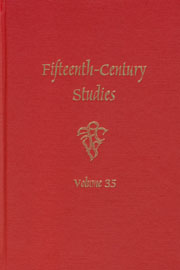Book contents
- Frontmatter
- Contents
- Preface
- Essays
- 1 Violencia en tres cuentos hagiográficos de la España medieval
- Physical Impairment in the First Surgical Handbooks Printed in Germany
- Serious Elements in Medieval French Farces: A New Dimension
- Narrative Afterlife and the Treatment of Time in Henryson's Testament of Cresseid
- Euclid in Boethius's De Consolatione Philosophiae and Some of its English Translations
- Seeking the Medieval in Shakespeare: The Order of the Garter and the Topos of Derisive Chivalry
- A Revelation of Purgatory and Chaucer's Prioress
- Eyeglasses for the Blind: Redundant Therapies in Meschinot and Villon
- Jean de Meun in the Cité des Dames: Author versus Authority
- The Festival Context of Villon's Pet au Deable: Martinmas in Late-Medieval Paris
1 - Violencia en tres cuentos hagiográficos de la España medieval
from Essays
Published online by Cambridge University Press: 12 September 2012
- Frontmatter
- Contents
- Preface
- Essays
- 1 Violencia en tres cuentos hagiográficos de la España medieval
- Physical Impairment in the First Surgical Handbooks Printed in Germany
- Serious Elements in Medieval French Farces: A New Dimension
- Narrative Afterlife and the Treatment of Time in Henryson's Testament of Cresseid
- Euclid in Boethius's De Consolatione Philosophiae and Some of its English Translations
- Seeking the Medieval in Shakespeare: The Order of the Garter and the Topos of Derisive Chivalry
- A Revelation of Purgatory and Chaucer's Prioress
- Eyeglasses for the Blind: Redundant Therapies in Meschinot and Villon
- Jean de Meun in the Cité des Dames: Author versus Authority
- The Festival Context of Villon's Pet au Deable: Martinmas in Late-Medieval Paris
Summary
Milagros Alameda-Irizarry
La imitación es una virtud y aparentemente no hubo una sociedad más virtuosa que la medieval. Por lo menos en el aspecto religioso, la imitación de Cristo y de los mártires de la tradición cristiana fue para algunos quizás el único camino hacia la redención. La literatura hagiográfica latina y subsecuentemente la de toda la cristiandad medieval se nutre de ese deseo o necesidad de imitar a aquellos cristianos que sacrificaron sus vidas con la esperanza de alcanzar así la vida eterna. Carlos Maynes, Santa enperatrís y Otas de Roma son tres cuentos españoles de fines de la Edad Media en los que el contenido hagiográfico basado en esa necesidad de imitar a Cristo no ha recibido aún toda la atención crítica que merece a pesar de que los cuentos forman parte del manuscrito Flos Santorum, una colección de vidas de santos. En los tres cuentos las protagonistas imitan a Cristo y a las santas y mártires cristianas en que se presentan como víctimas constantes del abuso físico y verbal que es característico de la literatura hagiográfica. Los cuerpos sangrantes, las doncellas ultrajadas y las amenazas de desmembramiento podrían causar revulsión en un lector desprevenido o no acostumbrado a la otredad que es la Edad Media. Toda esta violencia tiene su porqué y pasaré ahora a explicar cómo esto funciona en los tres cuentos.
- Type
- Chapter
- Information
- Fifteenth-Century Studies , pp. 1 - 11Publisher: Boydell & BrewerPrint publication year: 2009



